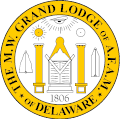Unity Lodge No. 32
Officers
| John A. Thompson, PM | Worshipful Master |
| Sean C. McMonagle, PM | Senior Warden |
| Charles Porter, PM | Junior Warden |
| John Lobley, PM | Secretary |
| Vernon H. Hanby | Treasurer |
| A. Tony Maxwell, PM | Senior Deacon |
| Lee Russykevizc | Junior Deacon |
| Vacant | Senior Steward |
| Vacant | Junior Steward |
| Jose Cruz | Tiler |
Past Masters
| John A. Thompson, PM | 2021-22 | ||
| Kenneth C. Weaver, Sr., PM | 2020 | Kenneth C. Weaver, PM | 2019 |
| John A. Thompson, PM | 2018 | John A. Bailey-Thompson | 2017 |
| 2016 | John K. Lobley | 2015 | |
| Dale Nickle, PM | 2014 | Dale Nickle, PM | 2013 |
| Dale Nickle | 2012 | Tony Maxwell | 2011 |
| R.Dan Major | 2010 | Tony Maxwell | 2009 |
| John Mullins | 2008 | Sean McMonagle | 2007 |
| John Mullins | 2006 | John Kuhn | 2005 |
| James Brady, Jr. | 2003-2004 | John Kuhn | 2001-2002 |
| John Kuhn | 2000 | Carton T. Melvin | 1994 |
| Richard W. Garland | 1992 | James Brady, Jr. | 1992 |
| James Brady, Jr. | 1987 | David Maxwell | 1986 |
| Jay F. Harlaub | 1985 | Richard W. Garland | 1983 |
| Vernon E. Lee | 1981 | Louis Savage | 1977 |
| Carlton T. Melvin | 1976 | Vernon E. Lee | 1975 |
| Robert F. Mowbray, Sr. | 1972 | William E. Willis | 1969 |
| Edward H. Horney | 1967 | Millard H. Widdekind | 1963 |
History
Unity Lodge No. 32 received its charter on November 5, 1955 to meet in Newport, Delaware in the Masonic Temple as, at the time, the third Blue Lodge in the building.
Stephen D. McDonald was appointed the first Worshipful Master. Fifty years later the Lodge can look back on a mostly successful existence. The Worshipful Masters have all been dedicated leaders with the objective of overseeing well-trained officers as well as the affairs of the Lodge.
In the years leading up to the mid-twenties, the officer’s line was always filled by brothers who diligently learned the work necessary to move up to the next station. The goal of being Worshipful Master was ingrained in each as a path, which would lead them to become better men and Masons. In recent years, filling the officer’s stations has been more difficult. As in most Masonic bodies today, the competition for time and commitment is challenged by cultural changes in our society. Thus, in most years since the mid-nineties, Worshipful Masters and Past Masters have filled the elected officer’s stations in Unity Lodge.
The Lodge has been blessed with a rich history. Though only existing for a fourth time since the Grand Lodge of Delaware was organized in 1806, Unity Lodge has contributed to the advancement of Freemasonry in Delaware. Though never having a Grand Master from the Lodge, Past Master Walter F. Lokey did serve as Grand Secretary for five years beginning in 1977 and Past Master John F. Selfridge was elected as Senior Grand Warden in 1978. A number of Past Masters have been appointed to the Grand Staff of various Grand Masters of Delaware. Also, many Unity Lodge members have distinguished themselves in other Delaware Masonic bodies in the York Rite and Scottish Rite as well as the Shrine at NUR Temple. Several members have been very active in the Eastern Star, DeMolay, Job’s Daughters and at the Veteran’s Hospital in Elsmere, Delaware. Lodge members have always been generous in their contributions to Masonic charities and with their time and dollars to the Masonic Home of Delaware.
Today, as Unity Lodge celebrates fifty years, members can look back on a history of brotherhood and fellowship through interaction with other Blue Lodges in Newport, some very entertaining Ladies Nights, outstanding speakers at most of the Regular Communications and very proficient degree work. In recent years “pot luck” dinners have preceded the Regular Communications.
Most of the Charter Members have passed on to their ultimate reward. If one pauses in the anteroom of the Newport Blue Lodge Room and gazes upwards he will see the portraits of all the Past Masters of Unity Lodge and the year(s) they served. Many who pause may have fond memories of a particular Past Master and of the year he served. There will always be memories of happy events as well as times not so happy. What the future holds for Unity Lodge is unknown but at this time the Lodge, though financially secure, is concerned with declining membership and difficulty in filling the officer’s stations with “new blood”. The challenge to overcome these concerns will determine the future.

